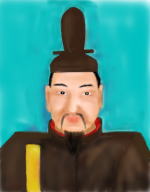Last update June 9, 2021
菅原道真

Sugawara Michizane
845 - 903
|

(C) Eigo-Zakkaya
|
神童、博士、追放、怨霊、そして天神
A Child Prodigy, Dignitary, Exile, Resenting Spirit, and Deity
 菅原氏って言えば、埴輪を考案したり、古墳造営の担当だった古代豪族、土師(はじ)氏の出身。曾おじいさんの古人(ふるひと)さんのときに苗字を菅原に変えて、文章の才能を使って朝廷に仕える家柄になったんだって。その頃は「文書経国」といって、学問をさかんにして国づくりをしようっていう方針があって、嵯峨天皇(在位809~823年)の時代には唐風の文化の最盛期だったらしいわ。
菅原氏って言えば、埴輪を考案したり、古墳造営の担当だった古代豪族、土師(はじ)氏の出身。曾おじいさんの古人(ふるひと)さんのときに苗字を菅原に変えて、文章の才能を使って朝廷に仕える家柄になったんだって。その頃は「文書経国」といって、学問をさかんにして国づくりをしようっていう方針があって、嵯峨天皇(在位809~823年)の時代には唐風の文化の最盛期だったらしいわ。
 朝廷に仕える家柄だけあって、おじいさんの清公(きよきみ)さん、お父さんの是善(これよし)さん、それから道真さんというふうに三代続いての文章(もんじょう)博士の家系よ~っ。道真が生まれたのは承和12年(845)乙丑(きのとうし)の6月25日、お母さんは少納言伴(大伴)氏の出身。小さい頃からすごく才能あふれる子供だったらしくて、「神童」って呼ばれたらしいわ。でもさ、小さい頃はさ、どこの子も優秀に見えるらしいけど。ちなみにアタシの同僚のカラスなんかも「うちの子は天才か」なんて言ってるわよ。でも、たいてい20歳過ぎると普通の人なのよね~っ。
朝廷に仕える家柄だけあって、おじいさんの清公(きよきみ)さん、お父さんの是善(これよし)さん、それから道真さんというふうに三代続いての文章(もんじょう)博士の家系よ~っ。道真が生まれたのは承和12年(845)乙丑(きのとうし)の6月25日、お母さんは少納言伴(大伴)氏の出身。小さい頃からすごく才能あふれる子供だったらしくて、「神童」って呼ばれたらしいわ。でもさ、小さい頃はさ、どこの子も優秀に見えるらしいけど。ちなみにアタシの同僚のカラスなんかも「うちの子は天才か」なんて言ってるわよ。でも、たいてい20歳過ぎると普通の人なのよね~っ。
 でも、道真さんは違ったみたいよ。わずか5歳で和歌を詠み、10歳過ぎて漢詩を創作。でもって、18歳で文章生(もんじょうせい)、23歳で文章得業生(もんじょうとくぎょうせい)、26歳のときには方略試(ほうりゃくし)に合格したっていうことだけど、アンタ、何のことかわかる?なんでも「文章生」ってのは、今の大学みたいなとこでさ、18歳ってのは最年少だったんだって。それから文章得業生ってのは今で言う「大学院生」、方略試は国家試験のようなものですごくむずかしかったらしいわ。
でも、道真さんは違ったみたいよ。わずか5歳で和歌を詠み、10歳過ぎて漢詩を創作。でもって、18歳で文章生(もんじょうせい)、23歳で文章得業生(もんじょうとくぎょうせい)、26歳のときには方略試(ほうりゃくし)に合格したっていうことだけど、アンタ、何のことかわかる?なんでも「文章生」ってのは、今の大学みたいなとこでさ、18歳ってのは最年少だったんだって。それから文章得業生ってのは今で言う「大学院生」、方略試は国家試験のようなものですごくむずかしかったらしいわ。
 それから30歳になって結婚、33歳のときには式部少輔(しきぶしょうゆう)、文章博士(もんじょうはかせ)になったのよ。文章博士ってのは「大学教授」のようなもので、当時はたったの2人しかいなくて、そのうちの1人なんだからすごいわね。もう一人の博士なんか11歳も年上の人で、実際、道真の家庭教師だったらしいから、いかに優秀だったかわかるじゃない。いいわねえ~っ、優秀な人って。アタシあこがれちゃう。でね、式部少輔ってのは、当時の政府のひとつの省である「式部」省の少輔、つまり役職のことで、大輔(だいふ)が課長なら少輔は課長代理ってとこね。
それから30歳になって結婚、33歳のときには式部少輔(しきぶしょうゆう)、文章博士(もんじょうはかせ)になったのよ。文章博士ってのは「大学教授」のようなもので、当時はたったの2人しかいなくて、そのうちの1人なんだからすごいわね。もう一人の博士なんか11歳も年上の人で、実際、道真の家庭教師だったらしいから、いかに優秀だったかわかるじゃない。いいわねえ~っ、優秀な人って。アタシあこがれちゃう。でね、式部少輔ってのは、当時の政府のひとつの省である「式部」省の少輔、つまり役職のことで、大輔(だいふ)が課長なら少輔は課長代理ってとこね。
 その後、一時的に讃岐守として地方へ回されたこともあったんだけど、宇多天皇のときに京都へ戻ってきて、蔵人頭(くろうどのとう)に任命されたりで活躍したらしいわ。そして、50歳のときに遣唐大使に任命されたんだけど、もうその頃は唐も国情不安定で文化も衰退し始めた頃だったのね。道真は遣唐使廃止を提案、決議されたんだって。ひょっとしたら行きたくなかったのかもね。そりゃそうよね、アタシだって危ない国に行くのはごめんよ~っ。
その後、一時的に讃岐守として地方へ回されたこともあったんだけど、宇多天皇のときに京都へ戻ってきて、蔵人頭(くろうどのとう)に任命されたりで活躍したらしいわ。そして、50歳のときに遣唐大使に任命されたんだけど、もうその頃は唐も国情不安定で文化も衰退し始めた頃だったのね。道真は遣唐使廃止を提案、決議されたんだって。ひょっとしたら行きたくなかったのかもね。そりゃそうよね、アタシだって危ない国に行くのはごめんよ~っ。
The Sugawara family is a spinoff from the Haji Clan, the inventor of the Haniwa (sepulchral earthenware) and dedicated constructor of royal tombs. Furuhito, a great-grandfather of Michizane changed his family name to Sugawara and started his service at the Imperial Court using his highly excellent skill of literature. The government had been promoting cultural development initiatives under the slogan "Strengthen the nation through academic activities." This movement reached its peak at the time of Emperor Saga (809 - 823).
When Michizane was born on June 25, 845, a year of "Yin Wood Ox", the Sugawara had become a highly esteemed family, with his grandfather and father (Kiyokimi and Koreyoshi) appointed as Doctor of Literature, consecutively for two generations. His mother was from the Ohtomo Clan, a big power in the early sixth century.
Michizane was an extremely talented child and dubbed as "a child prodigy." At five, he composed a Waka (Japanese verse), and at 11, he created his first Chinese character poem (Kanshi). He received the degree of Bachelor of Chinese History and Literature at 18 (the youngest in history), and at 23, Master of Chinese History and Literature (a graduate school student today). He succeeded in an extremely difficult government official certification test called Ho-ryaku-shi when he was 26.
He married at 30, and at 33, assumed the roles of Junior Assistant Minister of the Ministry of Personnel Affairs and Education, and Doctor of Chinese History and Literature. The latter is comparable to today's university faculty professor and applicable to only two people in those days. Another person sharing the position was Miyako-no-Yoshika, an eminent scholar and once Michizane's teacher and 11 years older than him.
After serving as Mayor of the county of Sanuki (present Kagawa Prefecture, Shikoku), he returned to Kyoto when Uda became Emperor, to assume the role of Private Secretary of Emperor. At 50, he was appointed as Chief Envoy to China (Tang Dynasty). Considering that the dynasty was now in political turmoil and cultural decline, however, Michizane proposed to discontinue sending envoys and the government eventually agreed to the proposal.
 そして、55歳で右大臣、延喜元年(901年)には従二位の位を与えられてまさに順調に進んでたのに、突然、大宰府左遷を言い渡されてしまったのね。「左遷」って言ったってさ、当時は僻地の大宰府、これって名目上の「流刑」ね。なんでも反対派の左大臣藤原時平が陰謀を企てて、反逆罪だとか言って無実の罪を着せてしまったらしいわよ。でさ、宇多天皇には信頼されていた道真だったけど、その頃はもう宇多天皇から次の醍醐天皇の時代になっていて、醍醐天皇は藤原時平と親しい間柄だったらしく、「じゃあ左遷しよう」なんてことになったのかもね。いやあね、ほんとに。やっぱり、才能や能力のありすぎる人って妬まれるのよね。アタシも気をつけなきゃ(は?)。
そして、55歳で右大臣、延喜元年(901年)には従二位の位を与えられてまさに順調に進んでたのに、突然、大宰府左遷を言い渡されてしまったのね。「左遷」って言ったってさ、当時は僻地の大宰府、これって名目上の「流刑」ね。なんでも反対派の左大臣藤原時平が陰謀を企てて、反逆罪だとか言って無実の罪を着せてしまったらしいわよ。でさ、宇多天皇には信頼されていた道真だったけど、その頃はもう宇多天皇から次の醍醐天皇の時代になっていて、醍醐天皇は藤原時平と親しい間柄だったらしく、「じゃあ左遷しよう」なんてことになったのかもね。いやあね、ほんとに。やっぱり、才能や能力のありすぎる人って妬まれるのよね。アタシも気をつけなきゃ(は?)。
 さて、大宰府での毎日、楽しいわけがなく、環境も悪かったらしいし、京都で待ってる奥さんも亡くなったりとかで、そりゃガックリくるわよね。生きているうちに京都に帰ることはなく、とうとう延喜3年(903年)2月25日に失意のうちにこの世を去ってしまったのよ。可哀想ねえ。こうして、道真が亡くなってしまったわけだけど、その後がまた大変だったらしいわよ。京都では天変地異が続き、陰謀を企てた張本人の藤原時平は39歳で急死、次いで醍醐天皇の皇太子が相次いで亡くなる、延長8年(930年)には宮廷に雷が落ちてたくさんの死傷者が出たんだって。
さて、大宰府での毎日、楽しいわけがなく、環境も悪かったらしいし、京都で待ってる奥さんも亡くなったりとかで、そりゃガックリくるわよね。生きているうちに京都に帰ることはなく、とうとう延喜3年(903年)2月25日に失意のうちにこの世を去ってしまったのよ。可哀想ねえ。こうして、道真が亡くなってしまったわけだけど、その後がまた大変だったらしいわよ。京都では天変地異が続き、陰謀を企てた張本人の藤原時平は39歳で急死、次いで醍醐天皇の皇太子が相次いで亡くなる、延長8年(930年)には宮廷に雷が落ちてたくさんの死傷者が出たんだって。
 でさ、昔は、悪いことはたいてい「怨霊の祟り(たたり)」だと信じられていたのね。これはきっと道真の怨霊が祟っているんだということで、当時、雨の恵みをもたらす「火雷天神」が祀られていた京都の北野に、道真の霊を鎮めるという目的で永延元年(987年)、「北野天満宮」が建てられたらしいわ。こうして道真イコール「天神さま」ってなことになり、時代が経つにつれて「学問の神さま」として全国に広がったっていうわけ。
でさ、昔は、悪いことはたいてい「怨霊の祟り(たたり)」だと信じられていたのね。これはきっと道真の怨霊が祟っているんだということで、当時、雨の恵みをもたらす「火雷天神」が祀られていた京都の北野に、道真の霊を鎮めるという目的で永延元年(987年)、「北野天満宮」が建てられたらしいわ。こうして道真イコール「天神さま」ってなことになり、時代が経つにつれて「学問の神さま」として全国に広がったっていうわけ。
じゃあ、最後に、天才詩人と言われた道真の有名な歌をひとつ。これは、左遷の地で京都の家にあった紅梅を思い出しながら詠んだ歌で、この歌を詠むと京都の邸宅から梅が大宰府まで飛んで来たっていう「飛び梅」伝説があるんだって。
東風吹かば にほひおこせよ梅の花
あるじなしとて春な忘れそ
His brilliant career continued to expand, for a while. Promoted to become the Minister of the Right (similar to the Deputy Chief Cabinet Secretary) and endowed with the Junior Second Rank in 901, his life seemed on an ever-thriving path. However, bad luck slipped in, suddenly depriving him of his titles and condemning him to exile to Dazaifu (in Fukuoka Prefecture), far away from the capital. Behind this was a conspiracy plot against him by his jealous opponent Fujiwara Tokihira, then the Minister of the Left, who apparently had falsely indicted him for treason. With a strong connection with the new emperor Daigo, the enemy succeeded in removing his rival from the political stage.
His life in Dazaifu was sad and lonely. He began ailing, and his wife, who had been waiting for his return in Kyoto, passed away. Deep in sorrow and despair, he died on February 25, 903, without ever returning to his home again.
After his death, a series of tragic events happened in Kyoto. Natural disasters attacked the capital, Fujiwara Tokihira, a plotter of the conspiracy, died a sudden death at 39, and Emperor Daigo's princes (the then designated heirs to the throne) consecutively passed away. Also, the thunder hit the Imperial Palace in 930, injuring and killing many people.
Ancient people strongly believed in avenging spirits and attributed all these terrible incidents to the strong anger of Michizane. To appease his rage and console his spirit, people built a shrine on the land of Kitano, Kyoto in 987. As the location originally enshrining a heavenly deity of fire and thunder, Michizane gradually gained the title of "Divinity of Heaven" and then, "Patron of Academy", attracting many visitors wishing for academic success and thus promoting the construction of many Temmangu shrines throughout Japan.
The following is the famous Waka poem created by Michizane during the exile in Dazaifu. In the poetry, he talks directly to the plum tree in his home garden in Kyoto:
My dear plum blossoms:
Catch east winds
To send your scent.
The master's not there;
But forget not spring.
A legend says after he created this verse, plum blossoms of his garden came flying over to see their master in Dazaifu. This story of "Flying Plum Blossoms" is loved by many Japanese.



 菅原氏って言えば、埴輪を考案したり、古墳造営の担当だった古代豪族、土師(はじ)氏の出身。曾おじいさんの古人(ふるひと)さんのときに苗字を菅原に変えて、文章の才能を使って朝廷に仕える家柄になったんだって。その頃は「文書経国」といって、学問をさかんにして国づくりをしようっていう方針があって、嵯峨天皇(在位809~823年)の時代には唐風の文化の最盛期だったらしいわ。
菅原氏って言えば、埴輪を考案したり、古墳造営の担当だった古代豪族、土師(はじ)氏の出身。曾おじいさんの古人(ふるひと)さんのときに苗字を菅原に変えて、文章の才能を使って朝廷に仕える家柄になったんだって。その頃は「文書経国」といって、学問をさかんにして国づくりをしようっていう方針があって、嵯峨天皇(在位809~823年)の時代には唐風の文化の最盛期だったらしいわ。 朝廷に仕える家柄だけあって、おじいさんの清公(きよきみ)さん、お父さんの是善(これよし)さん、それから道真さんというふうに三代続いての文章(もんじょう)博士の家系よ~っ。道真が生まれたのは承和12年(845)乙丑(きのとうし)の6月25日、お母さんは少納言伴(大伴)氏の出身。小さい頃からすごく才能あふれる子供だったらしくて、「神童」って呼ばれたらしいわ。でもさ、小さい頃はさ、どこの子も優秀に見えるらしいけど。ちなみにアタシの同僚のカラスなんかも「うちの子は天才か」なんて言ってるわよ。でも、たいてい20歳過ぎると普通の人なのよね~っ。
朝廷に仕える家柄だけあって、おじいさんの清公(きよきみ)さん、お父さんの是善(これよし)さん、それから道真さんというふうに三代続いての文章(もんじょう)博士の家系よ~っ。道真が生まれたのは承和12年(845)乙丑(きのとうし)の6月25日、お母さんは少納言伴(大伴)氏の出身。小さい頃からすごく才能あふれる子供だったらしくて、「神童」って呼ばれたらしいわ。でもさ、小さい頃はさ、どこの子も優秀に見えるらしいけど。ちなみにアタシの同僚のカラスなんかも「うちの子は天才か」なんて言ってるわよ。でも、たいてい20歳過ぎると普通の人なのよね~っ。 でも、道真さんは違ったみたいよ。わずか5歳で和歌を詠み、10歳過ぎて漢詩を創作。でもって、18歳で文章生(もんじょうせい)、23歳で文章得業生(もんじょうとくぎょうせい)、26歳のときには方略試(ほうりゃくし)に合格したっていうことだけど、アンタ、何のことかわかる?なんでも「文章生」ってのは、今の大学みたいなとこでさ、18歳ってのは最年少だったんだって。それから文章得業生ってのは今で言う「大学院生」、方略試は国家試験のようなものですごくむずかしかったらしいわ。
でも、道真さんは違ったみたいよ。わずか5歳で和歌を詠み、10歳過ぎて漢詩を創作。でもって、18歳で文章生(もんじょうせい)、23歳で文章得業生(もんじょうとくぎょうせい)、26歳のときには方略試(ほうりゃくし)に合格したっていうことだけど、アンタ、何のことかわかる?なんでも「文章生」ってのは、今の大学みたいなとこでさ、18歳ってのは最年少だったんだって。それから文章得業生ってのは今で言う「大学院生」、方略試は国家試験のようなものですごくむずかしかったらしいわ。 それから30歳になって結婚、33歳のときには式部少輔(しきぶしょうゆう)、文章博士(もんじょうはかせ)になったのよ。文章博士ってのは「大学教授」のようなもので、当時はたったの2人しかいなくて、そのうちの1人なんだからすごいわね。もう一人の博士なんか11歳も年上の人で、実際、道真の家庭教師だったらしいから、いかに優秀だったかわかるじゃない。いいわねえ~っ、優秀な人って。アタシあこがれちゃう。でね、式部少輔ってのは、当時の政府のひとつの省である「式部」省の少輔、つまり役職のことで、大輔(だいふ)が課長なら少輔は課長代理ってとこね。
それから30歳になって結婚、33歳のときには式部少輔(しきぶしょうゆう)、文章博士(もんじょうはかせ)になったのよ。文章博士ってのは「大学教授」のようなもので、当時はたったの2人しかいなくて、そのうちの1人なんだからすごいわね。もう一人の博士なんか11歳も年上の人で、実際、道真の家庭教師だったらしいから、いかに優秀だったかわかるじゃない。いいわねえ~っ、優秀な人って。アタシあこがれちゃう。でね、式部少輔ってのは、当時の政府のひとつの省である「式部」省の少輔、つまり役職のことで、大輔(だいふ)が課長なら少輔は課長代理ってとこね。 その後、一時的に讃岐守として地方へ回されたこともあったんだけど、宇多天皇のときに京都へ戻ってきて、蔵人頭(くろうどのとう)に任命されたりで活躍したらしいわ。そして、50歳のときに遣唐大使に任命されたんだけど、もうその頃は唐も国情不安定で文化も衰退し始めた頃だったのね。道真は遣唐使廃止を提案、決議されたんだって。ひょっとしたら行きたくなかったのかもね。そりゃそうよね、アタシだって危ない国に行くのはごめんよ~っ。
その後、一時的に讃岐守として地方へ回されたこともあったんだけど、宇多天皇のときに京都へ戻ってきて、蔵人頭(くろうどのとう)に任命されたりで活躍したらしいわ。そして、50歳のときに遣唐大使に任命されたんだけど、もうその頃は唐も国情不安定で文化も衰退し始めた頃だったのね。道真は遣唐使廃止を提案、決議されたんだって。ひょっとしたら行きたくなかったのかもね。そりゃそうよね、アタシだって危ない国に行くのはごめんよ~っ。 そして、55歳で右大臣、延喜元年(901年)には従二位の位を与えられてまさに順調に進んでたのに、突然、大宰府左遷を言い渡されてしまったのね。「左遷」って言ったってさ、当時は僻地の大宰府、これって名目上の「流刑」ね。なんでも反対派の左大臣藤原時平が陰謀を企てて、反逆罪だとか言って無実の罪を着せてしまったらしいわよ。でさ、宇多天皇には信頼されていた道真だったけど、その頃はもう宇多天皇から次の醍醐天皇の時代になっていて、醍醐天皇は藤原時平と親しい間柄だったらしく、「じゃあ左遷しよう」なんてことになったのかもね。いやあね、ほんとに。やっぱり、才能や能力のありすぎる人って妬まれるのよね。アタシも気をつけなきゃ(は?)。
そして、55歳で右大臣、延喜元年(901年)には従二位の位を与えられてまさに順調に進んでたのに、突然、大宰府左遷を言い渡されてしまったのね。「左遷」って言ったってさ、当時は僻地の大宰府、これって名目上の「流刑」ね。なんでも反対派の左大臣藤原時平が陰謀を企てて、反逆罪だとか言って無実の罪を着せてしまったらしいわよ。でさ、宇多天皇には信頼されていた道真だったけど、その頃はもう宇多天皇から次の醍醐天皇の時代になっていて、醍醐天皇は藤原時平と親しい間柄だったらしく、「じゃあ左遷しよう」なんてことになったのかもね。いやあね、ほんとに。やっぱり、才能や能力のありすぎる人って妬まれるのよね。アタシも気をつけなきゃ(は?)。 さて、大宰府での毎日、楽しいわけがなく、環境も悪かったらしいし、京都で待ってる奥さんも亡くなったりとかで、そりゃガックリくるわよね。生きているうちに京都に帰ることはなく、とうとう延喜3年(903年)2月25日に失意のうちにこの世を去ってしまったのよ。可哀想ねえ。こうして、道真が亡くなってしまったわけだけど、その後がまた大変だったらしいわよ。京都では天変地異が続き、陰謀を企てた張本人の藤原時平は39歳で急死、次いで醍醐天皇の皇太子が相次いで亡くなる、延長8年(930年)には宮廷に雷が落ちてたくさんの死傷者が出たんだって。
さて、大宰府での毎日、楽しいわけがなく、環境も悪かったらしいし、京都で待ってる奥さんも亡くなったりとかで、そりゃガックリくるわよね。生きているうちに京都に帰ることはなく、とうとう延喜3年(903年)2月25日に失意のうちにこの世を去ってしまったのよ。可哀想ねえ。こうして、道真が亡くなってしまったわけだけど、その後がまた大変だったらしいわよ。京都では天変地異が続き、陰謀を企てた張本人の藤原時平は39歳で急死、次いで醍醐天皇の皇太子が相次いで亡くなる、延長8年(930年)には宮廷に雷が落ちてたくさんの死傷者が出たんだって。 でさ、昔は、悪いことはたいてい「怨霊の祟り(たたり)」だと信じられていたのね。これはきっと道真の怨霊が祟っているんだということで、当時、雨の恵みをもたらす「火雷天神」が祀られていた京都の北野に、道真の霊を鎮めるという目的で永延元年(987年)、「北野天満宮」が建てられたらしいわ。こうして道真イコール「天神さま」ってなことになり、時代が経つにつれて「学問の神さま」として全国に広がったっていうわけ。
でさ、昔は、悪いことはたいてい「怨霊の祟り(たたり)」だと信じられていたのね。これはきっと道真の怨霊が祟っているんだということで、当時、雨の恵みをもたらす「火雷天神」が祀られていた京都の北野に、道真の霊を鎮めるという目的で永延元年(987年)、「北野天満宮」が建てられたらしいわ。こうして道真イコール「天神さま」ってなことになり、時代が経つにつれて「学問の神さま」として全国に広がったっていうわけ。